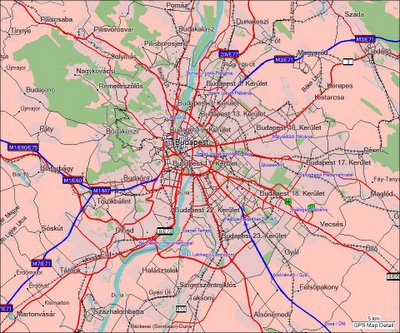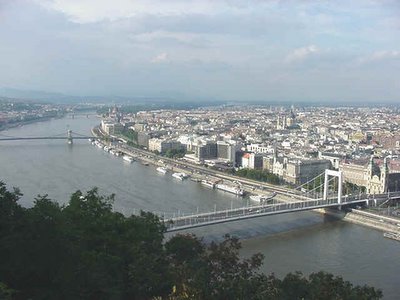REGENERA is due to make a working visit to Budapest in six weeks from now.
In the web-based review Transitions Online (TOL), under the heading: On a Razor's Edge Gabor Miklos writes:
"A social experiment in one of Budapest's most deprived areas is breaking new ground with its goals, its philosophy, and its methods."
Map of Budapest and vicinity. Click on the map, and a bigger, readable version opens on a new page. Source: Geomaps, based on satellite observation. - Joszefváros (Joseph City) is ont the Pest side at the North-East. Csepel lies to the South between two arms of the river. Gellert Hill and the former royal palace (now National History Museum) are on the Buda side to the West.
It has been a tough learning process:
"Unlike the Corvin Promenade Project (an earlier renewal scheme in another poor part of Jozsefvaros), where the construction forced the relocation of many inhabitants, the aim of the current project in the area known as the Magdolna quarter is for the current 12,000 or so residents to remain as housing and infrastructure are improved around them. Until a few years ago, urban renewal in Jozsefvaros meant only repairs and renovations to those buildings the local council deemed worthy. These interventions frequently proved counterproductive. “Privatization pressure” was often at work, even in the selection of buildings to be renovated: those who could afford to bought their rented apartments in such buildings, and those who couldn't were gradually forced to move, leading to increased social and ethnic segregation in the area. Lighter repairs, on the other hand, proved a waste of money because residents had little sense of communal propriety, and the gates, entry phones, or staircases selected for renovation over the residents' heads were soon in disrepair again. "As an occasional visitor to the city, I am in a position to confirm the above observations. More to the South, where the famous heavy industries of Csepel island used to be, whole former garden cities, built for the workers, are in a very derelict situation.
Another phenomenon: A considerable lump of the middle class cadres, whose relatively well-to-do position under Kadár depended heavily on collective services and subsidized goods, fell into poverty, as these disappeared and wages did not follow suit. So, poverty and dereliction begin to reign also in some parts of the green hills of Buda, where they used to live in one-family houses.
Traditional view of Budapest from Gellért Hill at the Buda (West) side of the Danube to the city-centre and Pest.
Due to a gaping lack of funds to invest and to an absence of private investors, willing to join into PPP's, the start of a new approach has to be modest, but firm in its objectives and methods. Gabor Miklos:
The solution could only be a change of heart: on the one hand, it had to be recognized that without consulting and involving the people living there, long-term results could not be achieved; on the other, it had to be acknowledged that it is pointless to renovate buildings when the problem is far more complex. After decades of deprivation that had only worsened in the past few years, Magdolna became the largest poor section of Jozsefvaros, itself a poverty-stricken section of Budapest. This past spring, 1,700 families living in the district received state housing support, one-quarter of them in Magdolna. The 13-block area did not grow organically: its boundaries were artificially drawn according to urbanistic criteria, turning it into one of the 11 “quarters” of Jozsefvaros a few years ago. Our experience, however, shows that local people are happy to have received a name, which — somewhat unexpectedly — has clearly helped nurture a sense of local identity, despite that the quarter embodies many of the problems a decayed inner city usually faces: deep poverty, high unemployment coupled with low education, poor living conditions, decaying public services, and poor public safety. Ethnic segregation has ensured that Roma make up a visibly high proportion of the population, though there has been no reliable study on the matter.The only way to overcome these difficulties and the absence of powerful external actors, is: mobilisation of the local people, and work with them for the common interest, creating a "win-win" situation.
The Magdolna experiment's goal is to improve living conditions for local people. Complete renovation is out of the question, so the specific jobs to be done will be decided upon in cooperation with tenants. The more the residents are willing to participate in the work, the more support they can expect from the authorities. Potential conflicts will be mediated by social workers contracted to the project developer, a non-profit company administered by the Jozsefvaros and Budapest councils.Leafing through the Internet, I see an impressing number of cheap real estate offers in Hungary and in Budapest. I believe, I saw a villa in Buda at sale for foreign acquirers, with photo, that is only some houses away from my family in law's house at Ursi Út (street). They are two medical specialists married to each other, but also financially unable now, to bear the costs of their simple one-family house.
Well, even if they are in danger, at the moment, I do not think that urgent structural help for them and people in their situation is needed.
However: Against the massive speculation and easy money gained with it, that is not reinvested in Hungarian property or innovation projects, I think that an EU initiative to support cities like Budapest in preserving their real estate and protecting it against speculation, is an urgent question, that could be raised by the urban networks in Brussels end eventually be argued in REGENERA's report.






No comments:
Post a Comment